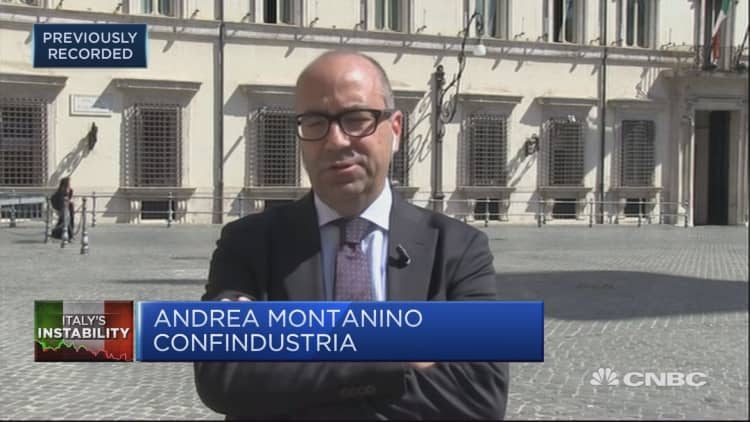Italy appears to have lurched further into another political crisis with gusto although Matteo Salvini, the leader of the increasingly powerful Lega party, is insisting that he has no intention of bringing down the government.
Tensions between Lega and its coalition partner, the Five Star Movement (M5S), have been brewing for months and on Monday, Prime Minister Giuseppe Conte threatened to step down if the two parties in his coalition government don't stop arguing.
At a press conference Monday, Conte urged the M5S and Lega party to set their differences aside and accelerate their reform program.
He also asked the two parties, which have experienced increasing tensions over policy since they formed a coalition in May 2018, to make a clear decision on the way forward.
"I therefore call on both political forces and, in particular, on their respective leaders, who also play a key role in the governance structure, to make a clear choice to tell me and tell us whether they intend to continue in the spirit of the (government) contract, drawn up with the aim of achieving its contents," he said in a live broadcast on Italian TV.
On Tuesday morning however, Matteo Salvini said he had no intention of bringing down the government and that he wanted it to accelerate its action, Reuters reported. He said he was ready to meet government partners whenever.
Italy's current political instability comes after months of rising tensions between the governing partners which formed a coalition government in May 2018 after an inconclusive election. Both Salvini and Luigi Di Maio, the head of the M5S, chose Conte as prime minister to lead Italy's 66th government since World War II.
The leaders have disagreed over various policies and election pledges, however, and while Lega was initially seen as the junior partner in the alliance, party leader Matteo Salvini has become more prominent and forthright. His party, which started as a secessionist northern party, has also seen wider regional election success in the last year and in the European Parliament elections in late May the party won 29 seats, compared to M5S' 14 seats.

In light of his and his party's success, many analysts now expect Salvini to become Italy's next resident of the Chigi Palace, the traditional residence of the country's prime ministers.
Brunello Rosa, chief executive and head of Research at Rosa & Roubini Associates, told CNBC Tuesday that Italy was facing a "momentous moment."
"Salvini gained massively in terms of popularity in the last year or so and then in the European election Lega came out as the first party and now the ratio of strengths within the coalition has completely changed," he told CNBC's Squawk Box Europe.
"In our view, Salvini is on his way to Palazzo Chigi to become prime minister but there are still a few hurdles to get there including potentially a general election that needs to be of course called by President Mattarella, it's not any ministers prerogative to do so."
Economists that follow Italy's political machinations, like JPMorgan's Marco Protopapa, doubt that Conte's attempts to normalize the situation will be successful.
"In our view, the internal contradictions of the populist coalition have been laid bare and run too deep to be healed in a lasting way. Arguably, both Lega and M5S are playing a tug of war game where each of them hopes that the other party will give up and take the responsibility to pull the plug," he said in a note late Monday.
JP Morgan's house view is that it is likely that the government will fall by the end of July, with a new general election at the end of September. Conte's press conference on Monday was, in its view, a "clear demonstration of the extreme fragility of the government at this stage."
Italy's latest political crisis comes at a fragile moment for Italy's economy which has just edged out of a short-lived recession (its third in a decade) but investors are nervous over the government's fractious quality and uncertainty over spending plans which have upset the European Commission, which sets spending rules and limits.
Conte himself noted on Monday that the government faced a "complex" 2020 budget process and needed financial markets to have confidence in Italy. He also called on both parties not to intervene in what he called the "delicate dialogue" between the country's Economy Minister Giovanni Tria and European Commission that is pressing Italy to lower its budget deficit and debt pile.


